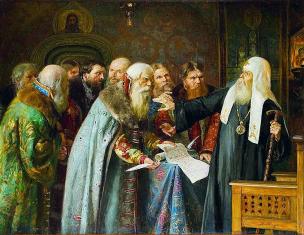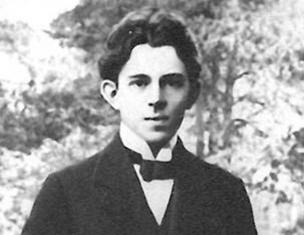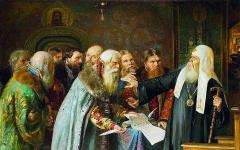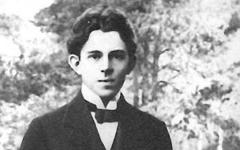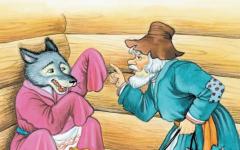Pyotr Ivanovich Bobchinsky is one of the minor characters in the comedy “The Inspector General,” a city landowner. Along with Pyotr Ivanovich Dobchinsky, he is not an official. Both of these heroes are wealthy landowners who do not live for a salary, and therefore do not depend on the mayor. Bobchinsky and Dobchinsky are the first to find out and report the secret arrival of the auditor from St. Petersburg. They are vying with each other to tell the “city fathers” this news. Despite their external similarity, these heroes have different personalities, often argue over trifles and try to outstrip each other in conversation. They are both short, with small bellies, gesticulate a lot with their hands and speak quickly, interrupting, repeating, or complementing each other.
Unlike Dobchinsky, Bobchinsky is more agile and lively. However, Dobchinsky is slightly taller and more serious than him. These heroes not only have the same names, but they think and speak almost the same. The stories they convey with a lot of unnecessary information only indicate that they are ordinary people and gossips. The author portrayed these similar images as ridiculous and comical. At the same time, they are helpless and tragic. They are worried that they are not part of the bureaucratic diocese and are trying in every possible way to prove their participation in the life of the city. After arrival
The comedy “The Inspector General” tells the reader about how human vices can destroy life in the city, make it corrupt, unstructured, and lost. Bobchinsky and Dobchinsky are the most striking secondary characters in the play. They have interesting characteristic and bring an original touch to the work, making it even more comical, brighter and more interesting. It is no coincidence that N.V. Gogol makes them so similar to each other, making it clear that all landowners are partly similar to each other.
Similar features
Bobchinsky and Dobchinsky, having almost the same surnames, they bear the same first and patronymic - Ivan Petrovich. This enhances the comic effect, especially since they are so similar in appearance. Each of them appears to the reader as small and plump, curious and sticking his nose into everything. Each of them has a round tummy, speaks quickly, and waves his arms when talking. Both of them are known city swindlers and liars.
Each of them is ready to listen at the door, run after the townspeople, and obtain fresh gossip by any honest or dishonest means. But, like all city officials, Bobchinsky and Dobchinsky are cordial and hospitable towards their superiors. The characterization of Bobchinsky and Dobchinsky from The Inspector General has not only common features, but also differences.
Differences between Bobchinsky and Dobchinsky
Ivan Petrovich Bobchinsky is more lively and nimble. You can say about him that he is a real weasel. Dobchinsky is a little taller, he is a little more serious than Bobchinsky. Dobchinsky has two children. One son was born before marriage, but he fully recognizes him as his child. Dobchinsky’s wife is not faithful to him, everyone sees her connection with judge Ammos Fedorovich Lyapkin-Tyapkin. Dobchinsky is a relative of the mayor, namely his godfather.
The role of characters in the work
Thanks to their ability to learn and spread city gossip, Bobchinsky and Dobchinsky bring the greatest confusion into the story with the arrival of the auditor. Having heard absolutely insignificant facts, they decide that Khleskov is the auditor, and inform all officials about this. The mess they have brewed is beyond the power of the entire city leadership to sort out, and Khlestakov, turning out to be a dishonest scoundrel, plays along with the officials. Bobchinsky and Dobchinsky are the main troublemakers of the work, because of whom this whole comic story began.
In the comedy “The Inspector General”, each of the characters contributes to the development of this story. They all have vivid images and meaningful names. Bobchinsky and Dobchinsky have nothing to do with the bureaucracy; they do not live on a salary, which means they do not depend on the mayor. But nevertheless, they constantly poke their nose into matters of “national importance,” confusing and distracting officials from their affairs. These images are very comical; they add brightness and originality to the work.
The author shows these characters as comical and absurd. But at the same time, we see how lost these characters are in life, knocked off their true values. This makes me feel sorry for them. They are lost in their lives, they also want to represent power. They are trying in every possible way to prove their involvement in the life of the city. Even without having to, each of them pays a bribe to the false auditor to show that they are also important people in the city.
Whyusteachescomedy « Auditor»?
This comedy teaches us not to lie, because everything secret becomes reality. Do your work diligently, “without letting your sleeves down,” and that is, be more responsible. It is also necessary to say about personal qualities: be kinder and then others will treat you the same way, do not be arrogant, because it is not arrogance that adorns a person, but modesty.
Reviews from contemporaries about Gogol's comedy "The Inspector General"
<...>they say that “The Inspector General” is an immoral comedy, because it shows only human vices and stupidities, that the mind and heart have no one to rest on from indignation and disgust, no bright side humanity for the reconciliation of the audience with humanity, for their edification, etc.<...>But how can we demand that every artist devote himself to a position? school teacher or guys? What do you need honest people in comedy if they were not part of the comic writer's plan? At a certain moment, in a given position, he looked at several faces - and drew them in the form, with those shades of light, the ugliness that they appeared to his gaze.<...>Is it really possible to conclude from the fact that the comedian did not bring out a single honest person that the author intended to prove that there are no honest people at all?<...>
The image of Bobchinsky and Dobchinsky in N.V. Gogol’s comedy “The Inspector General”
Completed by 8th grade student “A” Gusmanova Adelina
Aphorisms ( catchphrases) from the comedy "The Inspector General"
1. "For a big ship, a long voyage"
2. "Plucking flowers of pleasure"
3. “You’re not taking it according to your rank!”
4. “Alexander the Great is a hero, but why break the chairs?”
The image of Bobchinsky and Dobchinsky in the comedy “The Inspector General”
After reading the comedy “The Inspector General,” I tried to analyze all the characters. They are all similar in their own way and different in their own way. But the funniest landowners turned out to be Bobchinsky and Dobchinsky, and it is impossible to talk about each one separately; in my opinion, they are one whole. And here’s how N.V. Gogol describes them: “Both are short, short, very curious; they are extremely similar to each other, both have small bellies, both speak quickly and are extremely helpful with gestures and hands. Dobchinsky is a little taller and more serious than Bobchinsky, but Bobchinsky is more cheeky and lively than Dobchinsky.
In the life of the city, they play the role of carriers of various news and gossip, and therefore it is they who announce the arrival of the Auditor. Bobchinsky and Dobchinsky are not officials, but landowners, they do not depend on the Governor. Consequently, they do not need to be afraid of Khlestakov, but in order not to break away from the “herd” and to show that they also have at least some importance in society, they pay a bribe to Khlestakov. Bobchinsky and Dobchinsky are naive and not particularly educated, they are very “similar to each other and inseparable, they almost always appear together in comedy,” and it is no coincidence that their surnames are so similar and the names and patronymics are the same. They are always in a hurry and extremely fussy. These images are ridiculous and helpless; they want to mean something in society, but are doomed to remain a subject of ridicule for life.
Data: 02/10/2012 09:44 |Pyotr Ivanovich Bobchinsky and Pyotr Ivanovich Dobchinsky are characters in Gogol's comedy "The Inspector General", city landowners.
Source: comedy "The Inspector General"
There is a version that in Gogol’s time these surnames were perceived as Polish and were pronounced with an emphasis on the second syllable: Dobchinsky, Bobchinsky. This is confirmed by the following verses of P.A. Vyazemsky ("Khlestakov", 1866):
Dobchinsky glasnost, he wants
So that they know that Dobchinsky exists:
He is torn, rushing about, fussing,
To get in with people and the press.
...
All this is nonsense, but here's the thing:
Bobchinsky and Dobchinsky family,
With dull faith in his eyes
They stand in front of him with their mouths open.
Bobchinsky and Dobchinsky, both short, short, very curious; extremely similar to each other: both with small bellies; Both speak quickly and are extremely helpful with gestures and hands. Dobchinsky is a little taller and more serious than Bobchinsky, but Bobchinsky is more cheeky and lively.
- “The Inspector General”, Characters and Costumes. Notes for gentlemen actors.
Both Pyotr Ivanovich Bobchinsky and Dobchinsky are not officials, they are landowners, they have something to live on, they do not serve for a salary and, because of this, it would seem that they do not depend on the mayor, he is not their decree. In fact, they are inextricably linked with everything that happens in their provincial county town. And adjusting to the general unity with the town officials - they say, they are not the last people here, they also pay bribes to Khlestakov. What are they responsible for, why should they bribe the auditor? It is possible that they themselves will not answer: just so that they can be with everyone, not fall behind others, and not find themselves out of work. In Gogol’s interpretation, these images are absurd and helpless, they want to mean something in a social sense, but are doomed to get into trouble, they are funny and tragic - they are not included in the structure of the bureaucratic diocese, so they are trying to prove their participation in the life of the city; If they didn’t appear themselves, no one would remember about them, that’s why they fuss.
Bobchinsky and Dobchinsky were the first to connect the incognito warning from St. Petersburg with the real Khlestakov:
... yes, on the road, Pyotr Ivanovich says to me: “Today, I know, they brought fresh salmon to the tavern, so let’s go have a bite.” We had just arrived at the hotel when suddenly a young man...
This is how Gogol himself spoke about Bobchinsky in his “Warning for those who would like to play “The Inspector General” properly” (N.V. Gogol, 1842):
But the two city talkers Bobchinsky and Dobchinsky especially demand that it be played well. The actor must define them very well for himself. These are people whose entire life consisted of running around the city paying respects and exchanging news. Everything they had became a visit. The passion to tell swallowed up every other activity. And this passion became their driving passion and aspiration in life. In a word, these are people thrown out by fate for the needs of others, and not for their own. It is necessary that one can see the pleasure when he finally achieves the fact that he is allowed to talk about something. Curious - from the desire to have something to talk about. This even makes Bobchinsky stutter a little. They are both short, short, extremely similar to each other, both with small bellies. Both are round-faced, neatly dressed, with smoothed hair. Dobchinsky is even equipped with a small bald spot in the middle of his head; it is clear that he is not a single man, like Bobchinsky, but already married. But despite all this, Bobchinsky gains the upper hand over him due to his greater liveliness and even somewhat controls his mind. In a word, an actor needs to get sick with the glanders of curiosity and itchy tongue if he wants to play this role well, and he must imagine that he himself is sick with itchy tongue. He must forget that he is a completely insignificant person, as it turns out, and throw aside all the small attributes, otherwise he will end up just like caricatures.
From the persons of provincial society who do not belong to the ranks of officials, the comedy depicts two ordinary people: Bobchinsky and Dobchinsky. They most clearly show the emptiness and meaninglessness of provincial life. In the absence of any higher interests, society is engaged only in gossip and gossip, and main role in this regard, it is both friends who play.
They are the first newsmen of the city: having learned some news, they rush with it from house to house; for them there is no higher pleasure than to tell about something new and focus everyone’s attention on themselves: at these moments they feel like real heroes, especially since the rest of the time they are generally treated with disdain, to which, however, they are quite accustomed, and the mayor even uses them as his errands.
Bobchinsky and Dobchinsky are nobles separated from their estates; they are drawn into the vulgar life of city officials and are portrayed by Gogol as extremely empty people. Much of them is perceived as hyperbole, as a caricature. .. The bureaucratic environment, with its interests in cards and drinking, devastated these landowners, made them idle messengers spreading gossip around the city... Gogol showed this very interestingly in the language of Bobchinsky.
An empty man in the street, he reveals his entire essence precisely in the nature of his speech. Listening to his endlessly verbose speech, where one trifle, unnecessary detail is strung on another, it is not so easy to understand what he is talking about. The fact is that Bobchinsky does not know how to separate the main, essential from some tertiary detail, and therefore when he begins to speak, he grabs onto literally everything. And this immediately affects his speech: it is all short, very often unfinished phrases, only mechanically (through various connecting unions) interconnected.
It is clear that Bobchinsky’s spiritual emptiness also gives birth to the poverty of his speech. However, this does not prevent him and Dobchinsky from being pleased with themselves and thinking that they are the “salt of the earth.” It is for this vanity and pettiness that Gogol ridicules them. For Gogol, they are landowners according to their passport, who have not preserved anything of the nobility or class.
Addition to the images of Dobchinsky and Bobchinsky
“By profession,” both Dobchinsky and Bobchinsky are gossips. It is difficult to say what else they do, other than walking around various familiar houses with the sole purpose of giving a detailed report on what is happening in the city. They usually treat them with contempt, but sometimes they also have the “fortune” of becoming an object everyone's attention; This happens when they report important news. Having announced the arrival of the auditor, Dobchinsky and Bobchinsky became heroes of the moment. The mayor and all the officials listened to their story, peppered with long and unnecessary details, believed them and thereby satisfied their professional pride. But what a pitiful situation they found themselves in when all the wrath of the officials fell upon them. People like Dobchinsky and Bobchinsky are not used to being shy. What flattering epithets were given to them by the mayor, and the trustee of charitable institutions, and the judge, and the superintendent of schools and other guests of the mayor. “City gossips, damned liars,” shouts the mayor. “Damn dirty little morels, short-bellied morels,” echoes the judge. “Comedians,” says the caretaker.

